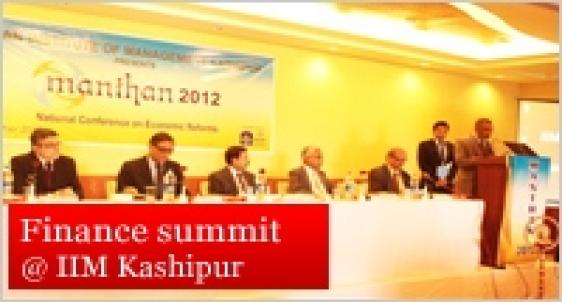
Inaugurating the summit, Dr Gautam Sinha, director, IIM Kashipur, emphasized the fact that India still faces many barriers in competition and works are required to be done for financial inclusion.
Reflecting on Indian economic reforms, Dr M Govinda Rao, member of the Economic Advisory Council to the Prime Minister, and director of the National Institute of Public Finance and Policy, said relaxations in the service sector have made India a service-centric country where less importance is given to the infrastructure sector. He said poor expenditure management and fiscal deficit in conjunction with increased petroleum prices had led the deceleration of the Indian economy in 2008. He emphasized the fact that reforms like creation of the National Investment Board will be helpful. Along with this, the private sector should invest more and present a road map to the government rather than reacting according to reforms.
Mr Robin Banerjee, deputy managing director of Bilcare Limited, said the country will continue to grow for at least next five decades as it has a median age of 25 years. But at the same time, in terms of per capita income, India stands 135th out of 180 countries, which raises a few concern. According to him, the motive of economic reforms should be targeted towards removing distortion i.e. creating policies which equally favour the rich and the poor and also manage competition.
Dr D S Malik, managing director, Amex Auto Group, described the scenario of the Indian auto industry post economic reforms. He emphasized the need of better tax policies. He also focussed on labor laws that are currently practised.
Mr Ranen Banerjee, executive director/partner, PricewaterhouseCoopers, was of the view that India is having weak macro fundamentals because of external factors like high crude oil prices and depreciating foreign exchange rates.
Dr V Ranganathan, mentor – faculty at IIM Kashipur, RBI Chair Professor on infrastructure and member of the Telecom Regulatory Authority of India, said making economic reforms are not enough, reforms in governance and attitude is the need of hour. Increasing the efficiency & response should be given more attention and reforms should not be limited only to papers but rather be implemented properly.
Stay tuned to MBAUniverse.com for more news from IIM Kashipur
























